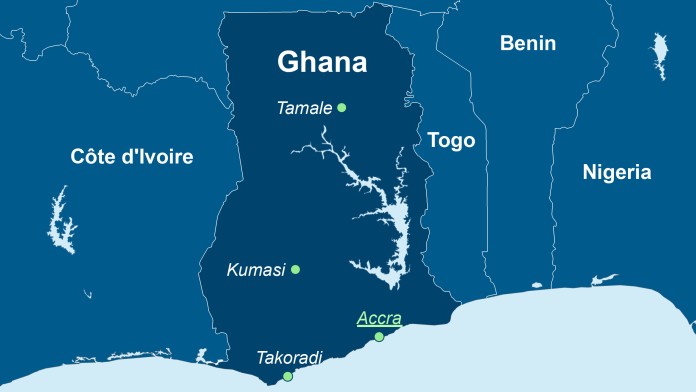
Ghana is a political and economic engine of the region. The country has been politically stable for decades, free elections are the rule. Economic output per capita has been increasing for years with few exceptions. Both the pandemic and the consequences of the Russian war in Ukraine clouded the economic outlook for the long term, but rising growth rates are forecast again. Although economic growth has not eliminated poverty, it has reduced it. The proportion of poor people has decreased, and a middle class is emerging. Ghana has been part of the group of lower middle income countries since 2010.
However, economically Ghana is heavily dependent on exports of raw materials such as gold, crude oil and cocoa. Accordingly, the country is prone to fluctuations in prices on the global market. In addition, growth has increased inequality in the country up to now. The better-off benefit more than the poor. The Muslim, rather rural north of the country participates less in growth than the Christian south, where most large cities are located. The already large income gap is rapidly widening. Youth unemployment is high. Environmental challenges also threaten the positive development. Climate change is being felt as precipitation patterns change and droughts increase. Mining and the sometimes illegal harvesting of timber lead to considerable environmental damage.
On behalf of Germany, KfW is supporting Ghana in the following areas:
Ghana has set up its own development bank (Development Bank of Ghana/DBG) based on KfW’s domestic promotional business. KfW is supporting it by promoting long-term loans for micro, small and medium-sized enterprises. KfW is also contributing to the establishment of a deposit insurance scheme by the Ghanaian central bank. Furthermore, KfW is involved in a microfinance programme.
The majority of employees in Ghana work in the informal sector and do not have any vocational training. KfW finances education vouchers for informal employees. It also promotes the expansion of the Kumasi Technical Institute into a centre of excellence in vocational training.
KfW is providing funds for Ghana’s districts so that they can implement their own decentralised infrastructure measures and provide citizen-oriented services. It also supports the regional structures of the Court of Auditors and an IT training centre for the tax authority in order to improve accountability and tax collection by the state.
KfW supports market-oriented agriculture. Tailored financial products support smallholders and stakeholders along the value chain.
Ghana has great potential for renewable energies. KfW is implementing numerous projects to build infrastructure, from transmission lines and low-interest loans for green energy to the installation of solar power systems for private households and companies. KfW also provides funds to make recycling electronic scrap more sustainable and environmentally friendly.
Germany is supporting Ghana in consolidating its status as a middle-income country and in continuing to stabilise the region.
KfW Office town
Director KfW Office: Arndt Wierheim
No. 7 Volta Street
P.O. Box 9698
K.I.A Airport Residential Area
Accra
Ghana
+23 33 02 76 39 42
Fax: +233 302 76 39 41